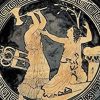The women, who are still devoted to their dead master, advise her to pray for revenge against Aegisthus and Clytaemestra and to ask her father’s blessings for herself, Orestes, and all others who hate his murderers.
Electra prays to Hermes to carry her message to Agamemnon, then calls upon her father. She asks him to have pity on herself and Orestes, both deprived of their rightful inheritance and status. She is almost a slave, she says, and Orestes is exiled from his homeland, but the murderers live in freedom and luxury. Let justice triumph and the murderers be punished.
When her prayer is finished, Electra pours the libations on her father’s grave. The chorus also pray at the tomb, asking for an avenger to punish those who killed Agamemnon and liberate the House of Atreus and all those, like themselves, who are forced to serve the tyrants.
Glancing around, Electra suddenly notices the two locks of hair. She examines them closely and realizes by their color and texture that they must belong to Orestes. Besides, as the chorus point out, who else would leave such a token on her father’s grave? A moment later, she sees a footprint in the soft ground near the tomb. She puts her own foot alongside it and discerns a marked family resemblance. It can belong to no one but Orestes, yet he is nowhere to be seen.
Electra is at her wit’s end with confusion and hope when Orestes steps out from his hiding place and identifies himself. At first she is unable to believe that he is really her brother, but the locks of hair are clearly his, and it was his foot that made the print she discovered. In addition, he shows her a piece of cloth with a unique design that she weaved for him when he was a child. Electra realizes that her brother has finally come home again and begins to weep with joy. She tells him that he is her entire family and the sole object of all her love, for Agamemnon and her sister Iphigenia are dead and she cannot love the mother who murdered her father.
Orestes comforts and reassures his sister, then they pray to Zeus. Orestes refers to the two of them as the orphaned children of the eagle Agamemnon and asks that the king of the gods, to whom the eagle is sacred, protect and help them. He also points out that the restoration of the House of Atreus will add to the glory and majesty of Zeus.
The chorus warn Orestes to be careful lest spies carry the news of his return to Aegisthus. Orestes is not afraid and says that Apollo will protect him. He reveals that the oracle of Apollo has ordered him to avenge his father’s death and has threatened him with the most horrible torments if he fails to obey this command. As if such an oracle were not enough, Orestes says, he has compelling personal motives to drive him — his filial duty to the memory of Agamemnon, his bitterness over the loss of his inheritance, and his obligations to the people of Argos, the conquerors of Troy, who now live in shame and are tyrannized by Aegisthus and Clytaemestra.
Analysis
Recognition scenes like this one involving Electra and Orestes were common features of later Greek tragedy. The recognition scene in The Choephori is the earliest to survive and was parodied by Euripides in his Electra. The circumstances of the recognition are artificial and seem a little implausible, but the scene fulfills an important function, and Aeschylus was probably not concerned with achieving an effect of verisimilitude. His main interest was to bring Orestes and Electra together so that the intrigue that is the basis of the plot could get under way.
Neither Orestes nor Electra is a full character in the modern theatrical sense, for Aeschylus does not attempt to examine too deeply their psychological or emotional states. To some extent, Orestes is an instrument in the hand of Apollo. He is dominated by the oracle’s command and does not question his obligation to kill Clytaemestra. Some critics have said that he is meant to be a symbol of a stage in human moral evolution, but there is genuine human feeling in his characterization, and Aeschylus makes a point of giving him individualized motives to supplement Apollo’s dictate.
Electra does not have the importance given her in later plays on this legend by Sophocles and Euripides. She disappears after the second stasimon and has no role in the remaining sections of the play. Her main functions are to describe the misery and humiliation she has suffered at the hands of the murderers and to give details of the aftermath of Agamemnon’s killing, all of which anger Orestes and make him more resolute. She also provides him with information about the situation in Argos that he would be unable to know otherwise, having been in exile for almost seven years.

